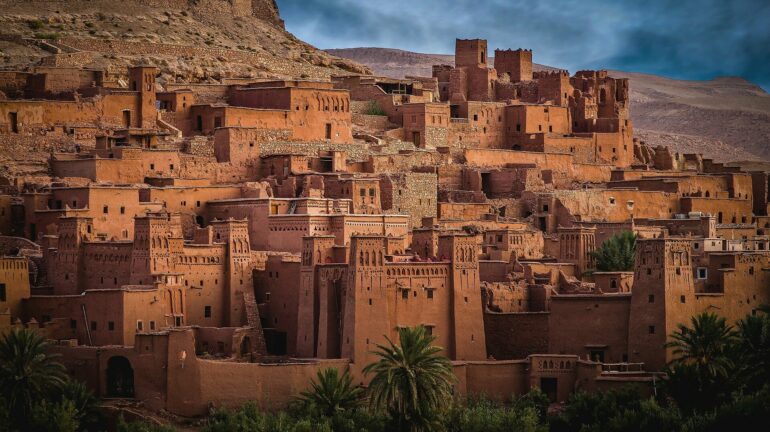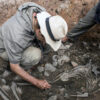Nearly four decades ago, Boston College quarterback Doug Flutie launched a game-winning, mid-field touchdown pass to upset the University of Miami on the game’s final play—prompting a subsequent surge in applications to the school in what has been dubbed the “Flutie Effect.”
A team of NYU researchers has now found evidence of this effect beyond the gridiron—and athletic competition. During and after Morocco’s surprising run to the World Cup semi-finals in the fall 2022, online searches on non-sports topics related to Morocco increased by 400%. These included upticks in global search volumes related to the country’s cuisine, culture, and attractions with queries such as “best time to visit Morocco,” “visa to Morocco,” and “couscous.”
In addition, an analysis of world-wide online sentiment toward Morocco—expressed on social media posts—found that feelings toward the country went from close-to-neutral in the month prior to the World Cup to a nearly 150% increase in positive sentiment during the month-long competition.
“Morocco not only had a remarkable run in the World Cup, but also created a compelling narrative for itself that captured global attention and spurred remarkable interest in the nation—in ways neither expected nor previously appreciated,” says Anasse Bari, a clinical associate professor at New York University’s Courant Institute of Mathematical Science and the senior author of the study, which appears in the 2023 International Conference on Computational Science and Computational Intelligence (CSCI).
Researchers have studied the effect of sports on the image of nations, often in an Olympic context. However, less understood is the impact of athletic success on broader interest in a particular country.
To gauge this, Bari, who was born and raised in Tangier, and his colleagues created Natural Language Processing (NLP) models to measure the sentiment (positive, negative, or neutral) embedded in English-language news articles related to Morocco before (Oct. 19, 2022 to Nov. 19, 2022) and during (Nov. 20, 2022 to Dec. 18, 2022) the World Cup—a common method for gauging the tone of news coverage. Sentiment was close to “neutral” before the World Cup, but positive sentiment grew by nearly 150% during the tournament.
While the increase in positive attention was not surprising given the team’s extraordinary and unexpected performance, did it have any impact beyond the field?
To explore this question, the researchers created a series of “Morocco Indices” designed to separately measure interest in the country and in its World Cup team. In addition to a “Country Index,” these included a “Jersey Index” to track searches on players’ jerseys, a “YouTube Index” to capture searches on game highlights, and a “Tourism Index” to measure interest in travel and cuisine (e.g., connecting “Morocco” to keywords such as “visa” and “flights”).
These indices were linked to public Reddit posts in English related to Morocco before, during, and after the World Cup, which Morocco will co-host in 2030. Specifically, the researchers designed a framework that captured both popularity and sentiment effects from three time periods: 30 days prior to the World Cup, the 30-day period when the World Cup was taking place, and 30 days after the World Cup.
Predictably, searches related specifically to the World Cup increased during the competition—but so did those linked to travel (“Rabat” and “Casablanca” had significant increases in search popularity) and food. Notably, among Moroccan cuisines, couscous and tajine maintained heightened popularity after the World Cup concluded—couscous with an increase of over 90% in comparison to its pre-World Cup popularity, followed by tajine with an 81% increase.
More specifically, Morocco’s victory over Portugal, marking its historic advance to the semi-finals, served as the pinnacle of popularity with an enormous 4,527% jump in mentions. Words semantically related to “Moroccan” skyrocketed by 3,758% during the World Cup in comparison to the period prior. In addition, several related terms started trending on Reddit during the World Cup; these included “Morocco Travel,” “Morocco Food,” and “Morocco Capital.” While the popularity of most of these terms diminished after the World Cup, topics related to “Morocco Travel,” in particular, sustained increased attention of 2,356% relative to the period during the competition.
“While we do not know if the World Cup success actually prompted tourism—there is no available public data on tourism in Morocco—it did generate interest in the country beyond sports,” says Bari, who leads the Courant Institute’s Predictive Analytics and AI Research Lab. “Morocco’s 2022 success may have certainly had an impact on FIFA’s decision for the country to co-host the 2030 World Cup. But we now know the team’s run paid dividends in unforeseen ways.”
The study’s other authors included members of Bari’s AI research group in NYU’s Department of Computer Science: Edward Hou, Charles Wang, Caitlyn Cui, Emos Ker, Alex Manko, Nawaf Alabdullah, Ali Alshehhi, Kelly Lawlor, Sebastian Straesser, and Advait Abrol.
More information:
Anasse Bari et al, Morocco’s Football Triumph in the 2022 FIFA World Cup: A Data-Driven Analysis of Sociocultural Impact Using Big Data Analytics, 2023 International Conference on Computational Science and Computational Intelligence (CSCI) (2024). DOI: 10.1109/CSCI62032.2023.00116
Provided by
New York University
Citation:
Can a World Cup run drive interest in a nation? New study finds evidence of the ‘Flutie Effect’ off the field (2024, July 22)



